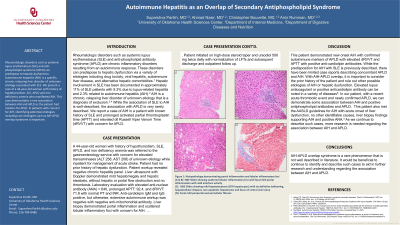Tuesday Poster Session
Category: Liver
P3897 - Autoimmune Hepatitis as an Overlap of Secondary Antiphospholipid Syndrome
Tuesday, October 24, 2023
10:30 AM - 4:00 PM PT
Location: Exhibit Hall

Has Audio

Suparshva Parikh, MD
University of Oklahoma Health Sciences Center
Oklahoma, OK
Presenting Author(s)
Suparshva Parikh, MD1, Ahmad Basil Nasir, MD2, Christopher Bouvette, MD2, Bryce Yohannan, MD2, Amir Rumman, MD3
1University of Oklahoma Health Sciences Center, Oklahoma, OK; 2University of Oklahoma College of Medicine, Oklahoma City, OK; 3University of Oklahoma Health Sciences Center, Oklahoma City, OK
Introduction: Systemic Lupus Erythematosus (SLE) and Anti-Phospholipid Antibody Syndrome (APLS) are chronic inflammatory disorders resulting from an autoimmune response. The association of SLE with autoimmune hepatitis (AIH) is well-described, while the association with APLS is very rarely described. We report a case of AIH in a patient with a known history of SLE and prolonged activated partial thromboplastin time (APTT) and elevated dilute Russell Viper Venom Time (dRVVT) with concern for APLS.
Case Description/Methods: A 44-year-old woman with a history of SLE and APLS. was referred to the gastroenterology service with concern for elevated transaminases (ALT 258, AST 208) IU/l of unknown etiology while inpatient for management of acute stroke. The patient's workup revealed a negative chronic hepatitis panel. Liver ultrasound with Doppler demonstrated mild hepatomegaly and hepatic steatosis, without hepatic or portal flow obstruction, and no thrombosis. Laboratory evaluation with elevated anti-nuclear antibody (ANA): 640 prolonged APTT: 92.4, and dRVVT: 71.8 with normal PT and INR. Anti-cardiolipin IgM and IgG are positive, but other extensive autoimmune workup was negative including anti-mitochondrial antibody. A liver biopsy demonstrated portal inflammation and scattered lobular inflammatory foci with concern for AIH. The patient was initiated on high-dose steroid taper and ursodiol 500 mg twice daily with normalization of LFTs and subsequent discharge and outpatient follow-up.
Discussion: This patient demonstrated new onset AIH with confirmed autoimmune markers of APLS with elevated dRVVT, APTT, and positive anti-cardiolipin antibodies. There have been limited case reports describing concomitant APLS and AIH. It is important to consider the prior history of the patient and rule out other possible etiologies of AIH or hepatic dysfunction. Elevated lupus anticoagulant or positive anticardiolipin antibody can be noted in a variety of diseases. In our patient, with a recent acute thrombotic event and newly confirmed APLS, we can demonstrate some association between AIH and positive antiphospholipid antibodies and APLS. This patient also met the AASLD guidelines for AIH with acute onset of liver dysfunction, no other identifiable causes, and liver biopsy findings supporting AIH. As we continue to describe such cases, more research is needed regarding the association between AIH and APLS.
Disclosures:
Suparshva Parikh, MD1, Ahmad Basil Nasir, MD2, Christopher Bouvette, MD2, Bryce Yohannan, MD2, Amir Rumman, MD3. P3897 - Autoimmune Hepatitis as an Overlap of Secondary Antiphospholipid Syndrome, ACG 2023 Annual Scientific Meeting Abstracts. Vancouver, BC, Canada: American College of Gastroenterology.
1University of Oklahoma Health Sciences Center, Oklahoma, OK; 2University of Oklahoma College of Medicine, Oklahoma City, OK; 3University of Oklahoma Health Sciences Center, Oklahoma City, OK
Introduction: Systemic Lupus Erythematosus (SLE) and Anti-Phospholipid Antibody Syndrome (APLS) are chronic inflammatory disorders resulting from an autoimmune response. The association of SLE with autoimmune hepatitis (AIH) is well-described, while the association with APLS is very rarely described. We report a case of AIH in a patient with a known history of SLE and prolonged activated partial thromboplastin time (APTT) and elevated dilute Russell Viper Venom Time (dRVVT) with concern for APLS.
Case Description/Methods: A 44-year-old woman with a history of SLE and APLS. was referred to the gastroenterology service with concern for elevated transaminases (ALT 258, AST 208) IU/l of unknown etiology while inpatient for management of acute stroke. The patient's workup revealed a negative chronic hepatitis panel. Liver ultrasound with Doppler demonstrated mild hepatomegaly and hepatic steatosis, without hepatic or portal flow obstruction, and no thrombosis. Laboratory evaluation with elevated anti-nuclear antibody (ANA): 640 prolonged APTT: 92.4, and dRVVT: 71.8 with normal PT and INR. Anti-cardiolipin IgM and IgG are positive, but other extensive autoimmune workup was negative including anti-mitochondrial antibody. A liver biopsy demonstrated portal inflammation and scattered lobular inflammatory foci with concern for AIH. The patient was initiated on high-dose steroid taper and ursodiol 500 mg twice daily with normalization of LFTs and subsequent discharge and outpatient follow-up.
Discussion: This patient demonstrated new onset AIH with confirmed autoimmune markers of APLS with elevated dRVVT, APTT, and positive anti-cardiolipin antibodies. There have been limited case reports describing concomitant APLS and AIH. It is important to consider the prior history of the patient and rule out other possible etiologies of AIH or hepatic dysfunction. Elevated lupus anticoagulant or positive anticardiolipin antibody can be noted in a variety of diseases. In our patient, with a recent acute thrombotic event and newly confirmed APLS, we can demonstrate some association between AIH and positive antiphospholipid antibodies and APLS. This patient also met the AASLD guidelines for AIH with acute onset of liver dysfunction, no other identifiable causes, and liver biopsy findings supporting AIH. As we continue to describe such cases, more research is needed regarding the association between AIH and APLS.
Disclosures:
Suparshva Parikh indicated no relevant financial relationships.
Ahmad Basil Nasir indicated no relevant financial relationships.
Christopher Bouvette indicated no relevant financial relationships.
Bryce Yohannan indicated no relevant financial relationships.
Amir Rumman indicated no relevant financial relationships.
Suparshva Parikh, MD1, Ahmad Basil Nasir, MD2, Christopher Bouvette, MD2, Bryce Yohannan, MD2, Amir Rumman, MD3. P3897 - Autoimmune Hepatitis as an Overlap of Secondary Antiphospholipid Syndrome, ACG 2023 Annual Scientific Meeting Abstracts. Vancouver, BC, Canada: American College of Gastroenterology.
